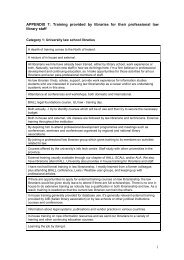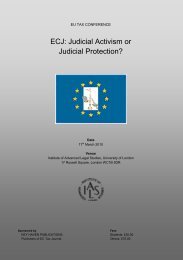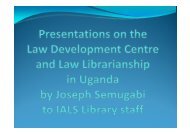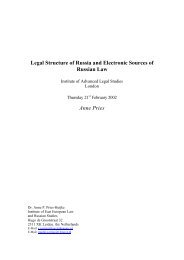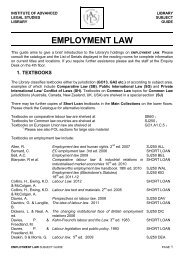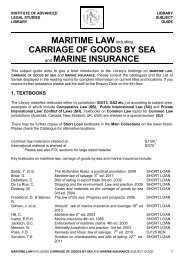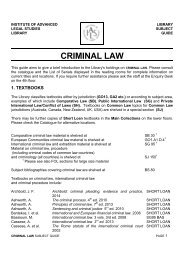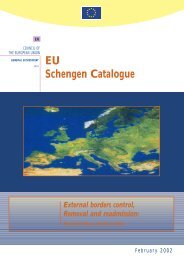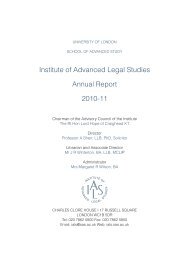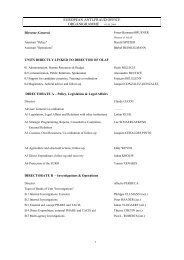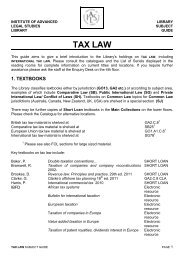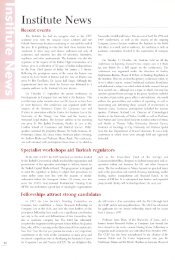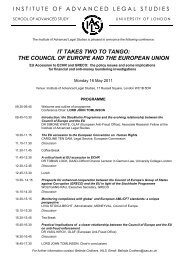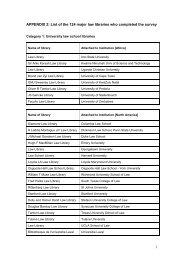a thesis - Institute of Advanced Legal Studies
a thesis - Institute of Advanced Legal Studies
a thesis - Institute of Advanced Legal Studies
Create successful ePaper yourself
Turn your PDF publications into a flip-book with our unique Google optimized e-Paper software.
18 TRUSTS IN GENERAL.<br />
the trustees should stand possessed <strong>of</strong> the property on the trusts<br />
specified ; in each case the result was the same—the husband was<br />
bound by the settlement.<br />
Of course, if the property in respect <strong>of</strong> which this question<br />
arises is given to the wife for her separate use, these decisions do<br />
not apply. The wife does not claim under the Married Women's<br />
Property Act then, and if she repudiates the settlement her<br />
husband does not become entitled to the property settled. The<br />
trustees <strong>of</strong> the repudiated settlement cannot, therefore, claim on<br />
the ground that the property belongs to the husband, and that he<br />
is bound by the settlement.<br />
Lunatics.—A. disposition <strong>of</strong> property, whether by instrument<br />
inter vivos or by will, by a person usually <strong>of</strong> unsound mind is valid<br />
if made during a lucid interval. (Hall v. Warren (1805), 9 Yes.<br />
605.) A disposition for valuable consideration made by a person<br />
while <strong>of</strong> unsound mind is valid, unless it can be shown that the<br />
person in whose favour it was made was aware <strong>of</strong> the insanity, in<br />
which case it is voidable. This applies to sales (Motion v. Camroux<br />
(1848), 2 Exch. 487 ; 4 Exch. 17 ; Elliot v. Lice, infra], to mortgages<br />
(Campbell v. Hooper (1855), 3 Sm. & Gr. 153), to contracts<br />
(Imperial Loan Co. v. Stone, (1892) 1 Q. B. 599), and presumably<br />
also to dispositions by way <strong>of</strong> trust.<br />
But if a disposition <strong>of</strong> property by a person <strong>of</strong> unsound mind is<br />
gratuitous, it is not merely voidable but void. (Elliot v. Ince<br />
(1857), 7 De GK M. & GK 475; Manning v. Gill (1872), L. B,<br />
13 Eq. 485.) It would follow from this that a voluntary trust,<br />
whether created by deed or will, by a person <strong>of</strong> unsound mind at<br />
the time, is wholly void whether the beneficiaries or trustees were<br />
cognizant <strong>of</strong> the insanity or not.<br />
What amount <strong>of</strong> insanity is sufficient and required to invalidate<br />
the disposition is a difficult question. It was discussed in the case<br />
<strong>of</strong> Banks v. Goodfcllow (1870, L. E. 5 Q. B. 549) with reference to<br />
a will, and it was held that the mere existence <strong>of</strong> delusions in the<br />
testator's mind are not sufficient if they have not affected the dispositions<br />
made by the will. There seems to be no reason why<br />
there should be any different rule for an instrument inter vivos.<br />
Where such a disposition is impeached on the ground <strong>of</strong> insanity,<br />
if the lunatic has since been found by inquisition to have been insane<br />
at the date when the disposition was made, the burden <strong>of</strong> pro<strong>of</strong> that<br />
it was made during a lucid interval is thrown on the party claiming<br />
under it. If he is not bound by the inquisition because not a



